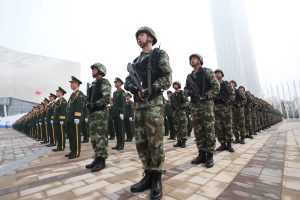The ongoing tension between the United States and China has been a focal point in international relations, with Taiwan often at the center of these discussions. However, despite the frequent portrayal by the U.S. that a potential Chinese invasion of Taiwan is imminent, the reality within China suggests a more nuanced strategy. China’s leadership is acutely aware that an invasion of Taiwan would not only risk demolishing the country’s economic machinery but could also destabilize the Chinese Communist Party of China (CCP) in ways never before seen.
The CCP’s legitimacy has long been tied to the economic prosperity of the nation. This prosperity has been the bedrock of stability in China, allowing the government to maintain control without the need for widespread repression. However, in times of economic fluctuation, nationalism becomes an important tool to maintain internal legitimacy. Taiwan, therefore, becomes a recurring, highly symbolic issue, evoked to rally nationalistic sentiments among the Chinese populace.
There are three primary ways an undemocratic government can impose itself on its people: economic prosperity, nationalism, and repression. China is fully aware that an invasion of Taiwan would likely force it to lean more heavily on nationalism as a mechanism of social legitimacy. However, such a move would simultaneously disrupt the very economic stability that underpins the CCP’s rule.
Nationalism, while powerful, has its limits. Overreliance on nationalism without the balancing effect of economic stability inevitably leads to repression. Once a government crosses into the realm of repression, it is difficult, if not impossible, to return to a state where nationalism alone can sustain its legitimacy. This shift could signify the beginning of the end for the CCP’s control.
Despite the potential catastrophic consequences of a military invasion of Taiwan, the United States continues to treat such a scenario as imminent. This perspective, however, plays directly into China’s hands. By treating an invasion as a near certainty, the U.S. inadvertently fuels Chinese nationalism, which the CCP can leverage to maintain its internal legitimacy during times of economic volatility.
The recent meetings between U.S. National Security Advisor Jake Sullivan and CCP foreign policy chief Wang Yi highlight the careful balancing act both nations are attempting. The U.S. continues to assert its strategic competition with China, particularly regarding Taiwan and the South China Sea, further inflaming nationalist sentiments within China.
Yet, China’s true intentions may be more strategic than the U.S. perceives. China benefits from the U.S. perception of an imminent threat of invasion. This perception allows China to bolster its naval capabilities – both as a preparation for any potential future conflict and as a means to keep its industrial and military complex robust. This dual approach serves to keep the U.S. on edge while providing China with a bargaining chip in international negotiations.
Moreover, within China, there exists a faction that benefits from the amplification of nationalist rhetoric – often referred to as the “wolf warrior” diplomats. These diplomats, along with other nationalist elements, have taken a more aggressive stance in international affairs, often using Taiwan as a central issue to galvanize domestic support. This group’s influence demonstrates that nationalism is not just a tool for the CCP but is also deeply embedded in the broader Chinese political landscape.
China’s approach to Taiwan is less about an actual invasion and more about the strategic use of tensions to gain leverage. By allowing tensions to escalate periodically, China can negotiate for advantages during the subsequent de-escalation phase. This cyclical pattern keeps the United States engaged in a reactive stance, forcing it to revisit the Taiwan issue with greater frequency and intensity due to its shorter political cycles.
In contrast, China’s longer political cycles allow for a more measured approach. While the U.S. must constantly address Taiwan to appease domestic political pressures, China can afford to play the long game, feeding the perception of an imminent threat to keep the U.S. engaged while avoiding the actual economic and political costs of a full-scale invasion.
The relationship between the U.S. and China, particularly regarding Taiwan, is a complex interplay of economic interests, national security concerns, and political strategy. While the U.S. views the situation through the lens of an imminent military threat, China sees an opportunity to maintain internal stability through the controlled escalation of tensions.
As long as the United States continues to treat a Chinese invasion of Taiwan as an imminent threat, it inadvertently strengthens the very forces within China that thrive on nationalism. For China, this is a strategic advantage, allowing it to maintain its internal legitimacy while keeping the U.S. off-balance. In this context, the real danger is not the invasion of Taiwan, but the gradual erosion of the mechanisms that have maintained peace and stability in the region for decades.

































